Low hemoglobin levels in the blood, also known as anemia, can result in a variety of symptoms and health issues. Fortunately, there are various foods that increase hemoglobin levels, such as Spinach, Lentils, and Beetroot. They are rich in iron, folate, vitamin B12, and other essential nutrients, which can help boost hemoglobin production in the body.

Hemoglobin (hb) is responsible for carrying oxygen from the lungs to the body’s tissues and organs and also helps remove carbon dioxide from the body. When hemoglobin levels are low, the body may not receive enough oxygen, leading to fatigue, weakness, and shortness of breath.
In this article, we will explore a list of easily available foods to increase hb levels naturally. Include these foods in your everyday diet to promote healthy blood levels if you suffer from anemia.
foods that increase hemoglobin in blood
Several foods boost your hemoglobin levels, such as Lentils, Spinach, Beetroot, Pomegranate, Red meat, Fish, Nuts, and seeds. If you take these foods regularly, you don’t need to rely on pills, and your hemoglobin levels will rise naturally.
Let’s discuss more about the 7 top most readily available foods enriched with iron, vitamins, and other nutrients that help increase hemoglobin in blood.
1. Spinach
Spinach is a nutrient-rich leafy green vegetable that has been recognized for its potential to increase hemoglobin levels. Here’s more information about spinach and its role in hemoglobin production:
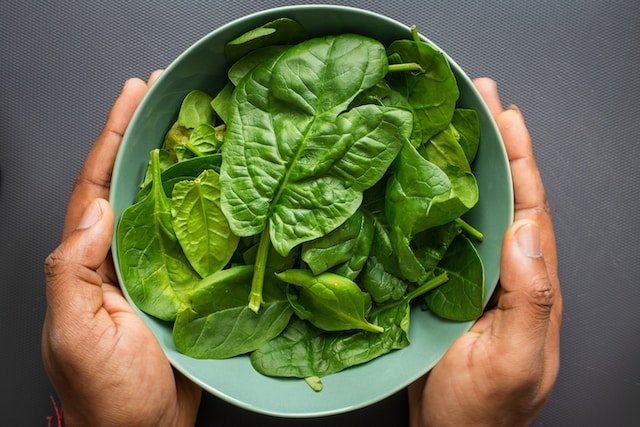
- Iron content: Spinach is an excellent source of dietary iron, which is a crucial component of hemoglobin. Iron is required for the production of hemoglobin, the protein that binds with oxygen in the lungs and carries it to the body’s tissues. Including spinach in your diet can help replenish iron stores in the body and promote healthy hemoglobin production.
- Folate content: Spinach is also rich in folate, which is a type of B vitamin that plays a role in hemoglobin synthesis. Folate is essential for the production of red blood cells, including hemoglobin. Adequate folate levels in the body can support hemoglobin production and help prevent anemia, which is a condition characterized by low hemoglobin levels.
- Vitamin B12 content: Spinach contains a moderate amount of vitamin B12, which is necessary for the production of hemoglobin. Vitamin B12 works in conjunction with folate to support the synthesis of red blood cells and hemoglobin. Including spinach in your diet can help ensure adequate vitamin B12 levels in the body, which can aid in hemoglobin production.
- Antioxidant properties: Spinach is rich in antioxidants, such as vitamin C and beta-carotene, which can help protect the cells from damage and reduce inflammation. These antioxidant properties of spinach can help maintain healthy blood vessels and support optimal blood flow, which is essential for hemoglobin to effectively carry oxygen to the body’s tissues.
Related Topic: The Top 6 Dos And Don’ts Of Eating For Energy
2. Lentils
Lentils are a type of legume that are known for their high nutrient content and potential to boost hemoglobin levels in the blood. Here’s more information about lentils and their role in hemoglobin production:
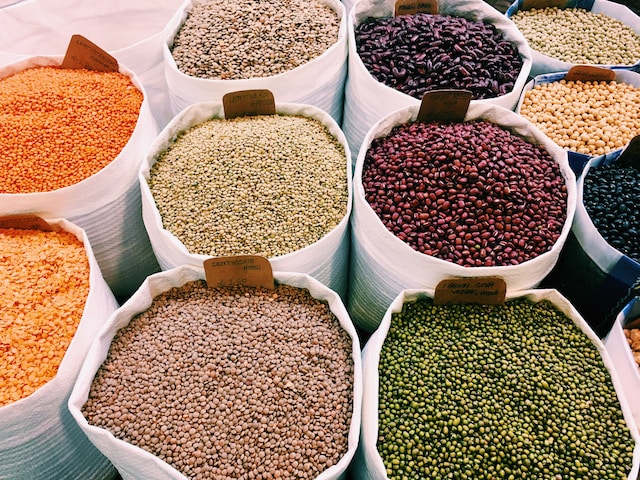
- Iron content: Lentils are an excellent dietary iron source, a critical component of hemoglobin. Iron is necessary for producing hemoglobin, which binds with oxygen in the lungs and carries it to the body’s tissues. Including lentils in your diet can help replenish iron stores in the body and promote healthy hemoglobin production.
- Protein content: Lentils are also rich in plant-based protein, which is essential for the synthesis of hemoglobin. Protein provides the building blocks needed for the production of red blood cells, including hemoglobin. Adequate protein intake from lentils can support hemoglobin production and overall blood health.
- Folate content: Lentils are a good source of folate, which is a type of B vitamin that plays a role in hemoglobin synthesis. Folate is essential for the production of red blood cells, including hemoglobin. Lentils can provide a significant amount of folate, which can support optimal hemoglobin production in the body.
- Fiber content: Lentils are high in dietary fiber, which can help regulate blood sugar levels and improve gut health. Maintaining stable blood sugar levels, including hemoglobin production, is vital for overall blood health. A healthy gut can also enhance nutrient absorption, including iron and other essential nutrients necessary for hemoglobin synthesis.
Related Post: 10 Foods Rich in Melanin for a Healthy Skin Glow
3. Beetroot
Beetroot is a nutrient-rich vegetable known for its potential to increase hemoglobin levels in the blood. It is considered one of the top foods to increase hemoglobin due to the following reasons:
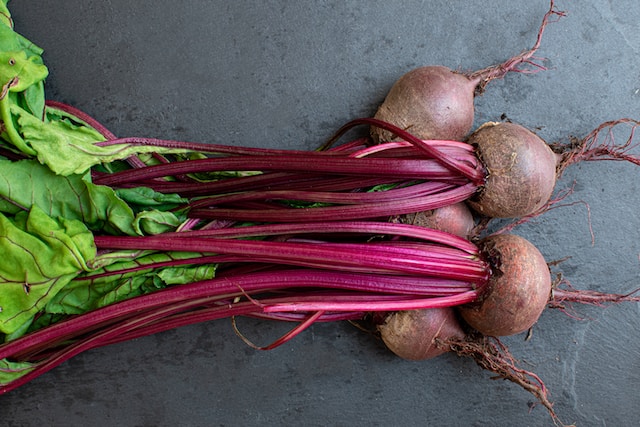
- High iron content: Beetroot is a good source of dietary iron, which is essential for hemoglobin production. Iron is a critical component of hemoglobin, which binds with oxygen in the lungs and carries it to the body’s tissues. Including beetroot in your diet can help replenish iron stores in the body and promote healthy hemoglobin production.
- Rich in folate: Beetroot is also a good source of folate, a type of B vitamin that plays a role in hemoglobin synthesis. Folate is necessary for the production of red blood cells, including hemoglobin. Adequate folate levels can support hemoglobin production and help prevent anemia.
- Antioxidant properties: Beetroot contains powerful antioxidants such as betalains, which have anti-inflammatory and antioxidant properties. These antioxidants can help protect the cells from damage and reduce inflammation, promoting healthy blood vessels and optimal blood flow. This can support hemoglobin’s ability to carry oxygen effectively to the body’s tissues.
- Nitrate content: Beetroot is naturally rich in dietary nitrates, converted to nitric oxide in the body. Nitric oxide helps relax and dilate blood vessels, improving blood flow and supporting hemoglobin’s function in carrying oxygen.
4. Pomegranate
Pomegranate is a juicy and delicious fruit that is considered one of the top fruits that increase hemoglobin due to the following reasons:
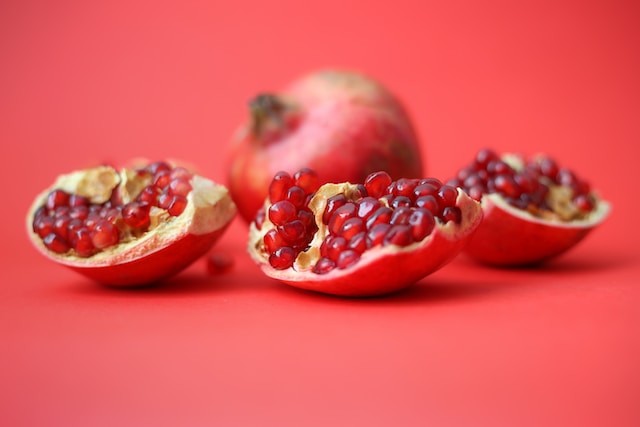
- High iron content: Pomegranate is a good source of dietary iron, which is crucial for hemoglobin production. Iron is a key component of hemoglobin, which carries oxygen in the blood to the body’s tissues. Including pomegranate in your diet can help replenish iron stores in the body and promote healthy hemoglobin production.
- Rich in vitamin C: Pomegranate is also a good source of vitamin C, which plays a role in iron absorption. Vitamin C enhances the absorption of iron from plant-based sources like pomegranate, helping the body utilize iron more effectively for hemoglobin synthesis.
- Antioxidant properties: Pomegranate is known for its high antioxidant content, particularly in the form of punicalagins. These antioxidants help protect cells from damage, reduce inflammation, and support overall blood vessel health. Healthy blood vessels are essential for optimal blood flow and efficient hemoglobin function.
- Nitric oxide production: Pomegranate has been shown to increase nitric oxide production in the body. Nitric oxide helps relax and dilate blood vessels, improving blood flow and supporting hemoglobin’s ability to carry oxygen to the tissues.
5. Red Meat
Red meat is often recognized as one of the foods that increase hemoglobin levels due to its rich iron content. Iron is a vital nutrient required for hemoglobin production, and red meat, such as beef, and lamb, is a particularly good source of heme iron, which is more readily absorbed by the body compared to non-heme iron found in plant-based foods.
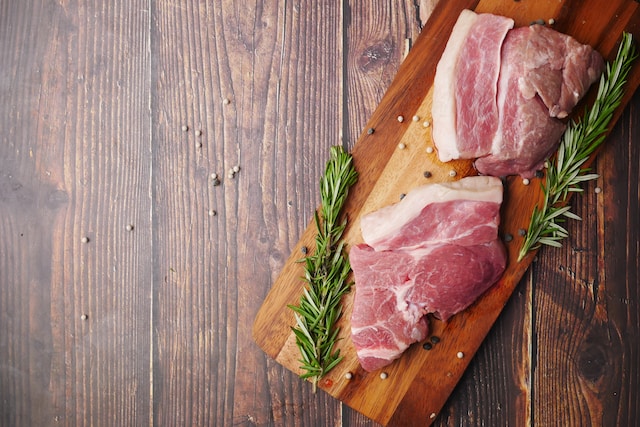
Consuming red meat as part of a balanced diet can help replenish iron stores in the body and support healthy hemoglobin production. However, it’s essential to consume red meat in moderation and in accordance with dietary guidelines, as excessive consumption may have potential health risks.
It’s recommended to consult with a healthcare professional for personalized advice on incorporating red meat into your diet, as red meat has other health concerns.
Related Article: 12 Natural Solutions For Heartburn You Must Try!
6. Fish
Fish is a nutritious food that is often included in the list of foods to increase HB due to several reasons:
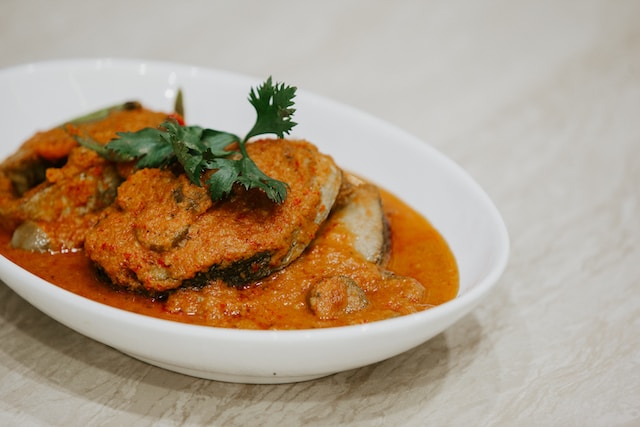
- High in iron: Fish, particularly types like tuna, salmon, and sardines, are rich sources of heme iron, which is easily absorbed by the body. Iron is a key component of hemoglobin, and consuming fish can help replenish iron stores in the body and support healthy hemoglobin production.
- Rich in omega-3 fatty acids: Fish is also a good source of omega-3 fatty acids, which are essential fats that have been linked to various health benefits, including supporting heart health and reducing inflammation. Omega-3 fatty acids can also help improve blood flow and circulation, which can enhance the delivery of oxygen to tissues and organs, supporting optimal hemoglobin function.
- Vitamin B12 content: Fish is a good source of vitamin B12, which is essential for hemoglobin synthesis. Vitamin B12 helps the body produce healthy red blood cells and supports proper hemoglobin formation.
- Protein content: Fish is a high-quality source of protein, which is important for overall health and plays a role in hemoglobin production. Protein is necessary for the production of amino acids, which are building blocks of hemoglobin.
- Low in fat: Many types of fish are relatively low in saturated fat compared to other animal-based protein sources, making them a healthy option for individuals looking to increase hemoglobin during pregnancy without excessive fat intake.
7. Nuts and Seeds
Nuts and seeds are often considered as healthy options among the “foods to increase hemoglobin” due to several reasons:
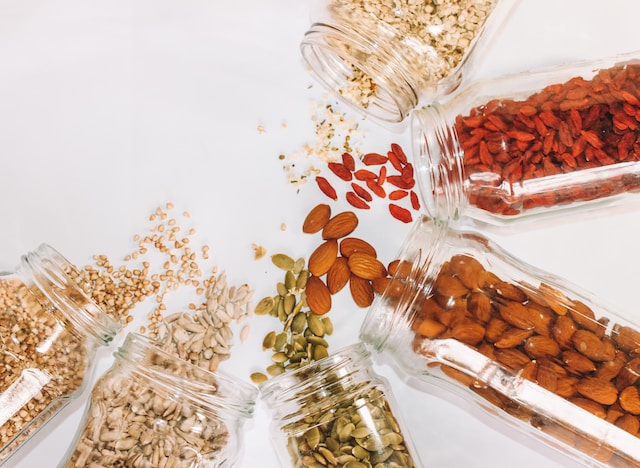
- Iron-rich: Many nuts and seeds, such as almonds, sunflower seeds, and pumpkin seeds, are good sources of plant-based iron, known as non-heme iron. While non-heme iron is not as easily absorbed by the body as heme iron, it can still contribute to increasing hemoglobin levels when consumed regularly as part of a balanced diet.
- Protein content: Nuts and seeds are also good sources of plant-based protein, which is necessary for the production of amino acids that are essential for hemoglobin synthesis. Protein also plays a role in overall blood health and supports the production of healthy red blood cells.
- Healthy fats: Nuts and seeds are rich in healthy fats, such as monounsaturated and polyunsaturated fats, which are important for heart health and overall well-being. These fats can also help improve blood flow and circulation, enhancing the delivery of oxygen to tissues and organs, which in turn supports optimal hemoglobin function.
- Vitamin and mineral content: Nuts and seeds are packed with essential vitamins and minerals, including vitamin E, magnesium, and copper, which are important for healthy blood cell production and hemoglobin synthesis.
Other Tips to Increase Your Hemoglobin Levels at Home
In addition to incorporating hemoglobin-boosting foods into your diet, you can follow several other tips to increase your hemoglobin levels at home. Here are some expert suggestions:
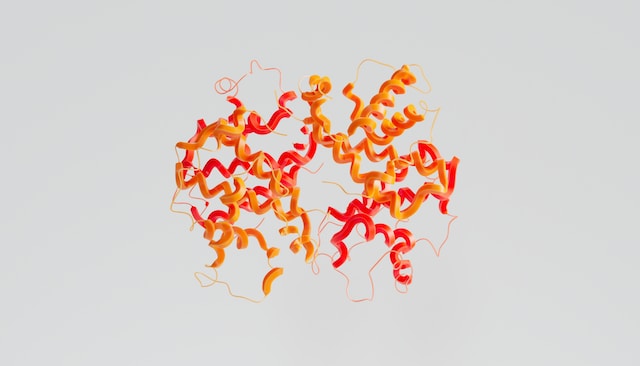
- Vitamin C-rich foods: Consuming foods rich in vitamin C, such as citrus fruits, berries, bell peppers, and leafy greens, can help enhance iron absorption from plant-based sources of iron, as vitamin C aids in the absorption of non-heme iron.
- Avoid iron inhibitors: Some foods and beverages, such as coffee, tea, and calcium-rich foods, can inhibit iron absorption. It’s best to avoid consuming these foods or beverages in close proximity to iron-rich meals or supplements to optimize iron absorption.
- Cooking in iron pans: Cooking foods in iron pans or pots can help increase the iron content of the food, which may be beneficial for those with low hemoglobin levels.
- Adequate hydration: Staying properly hydrated is important for overall health and can help maintain optimal blood volume, which is essential for healthy hemoglobin levels. Drink plenty of water throughout the day and avoid excessive consumption of sugary or caffeinated beverages.
- Regular physical activity: Regular exercise and physical activity can help improve blood flow and circulation, which can enhance the delivery of oxygen to tissues and organs, supporting optimal hemoglobin function.
- Avoid smoking and limit alcohol consumption: Smoking and excessive alcohol consumption can negatively impact blood health and hemoglobin levels. Quitting smoking and limiting alcohol intake can be beneficial for improving hemoglobin levels.
- Get enough sleep: Adequate sleep is crucial for overall health and well-being, including blood health. Aim for 7-8 hours of quality sleep each night to support optimal hemoglobin production and overall blood health.
- Manage stress: Chronic stress can affect blood health and hemoglobin levels. Practice stress management techniques such as meditation, yoga, deep breathing, or other relaxation techniques to reduce stress and support healthy hemoglobin levels.
Watch Expert Advice on foods to increase hb-
Final Thoughts
We have introduced you to the best foods that increase hemoglobin levels in blood. Spinach, lentils, beetroot, pomegranate, red meat, fish, nuts, and seeds are all excellent choices rich in iron, vitamin C, and other essential nutrients that promote the production of hemoglobin in the blood.
Remember to pair iron-rich foods with sources of vitamin C to enhance iron absorption. Along with a healthy diet, maintaining good overall nutrition, staying hydrated, and regular exercise are also important lifestyle factors that can contribute to healthy hemoglobin levels.
However, it’s always best to consult with a qualified healthcare professional or a registered dietitian before making any significant changes to your diet or lifestyle, especially if you have an existing medical condition or are on any medications.
By incorporating these foods into your diet and making lifestyle adjustments as needed, you can take proactive steps to increase your hemoglobin levels and support optimal health naturally.
Frequently Asked Questions
Which food gives more hemoglobin?
Foods that help to raise hemoglobin include red meat, poultry, fish, lentils, beans, tofu, fortified cereals, spinach, beetroot, pomegranate, nuts, and seeds.
Can a vegetarian or vegan diet provide enough iron for increasing hemoglobin levels?
Yes, a well-planned vegetarian or vegan diet can provide enough iron for increasing hemoglobin levels. Plant-based sources of iron include lentils, beans, tofu, fortified cereals, spinach, beetroot, nuts, and seeds. Combining these iron-rich foods with sources of vitamin C can enhance iron absorption.
Are there any other lifestyle factors that can help increase hemoglobin levels?
Yes, along with a healthy diet, maintaining good overall nutrition, staying hydrated, getting regular exercise, and managing any underlying health conditions, such as gastrointestinal disorders or hormonal imbalances, can also contribute to healthy hemoglobin levels.
How long does it take for dietary changes to show an effect on hemoglobin levels?
The time taken for dietary changes to show an effect on hemoglobin levels may vary depending on various factors, including the severity of anemia, the individual’s overall health, and adherence to dietary changes. It’s best to consult with a healthcare professional for personalized advice and monitoring.
How much beetroot should I eat to increase hemoglobin?
There is no specific recommended amount of beetroot to eat to increase hemoglobin levels, as individual dietary requirements may vary. However, beetroot is rich in iron, folic acid, and antioxidants, which can support faster hemoglobin production.
Does carrot increase hemoglobin?
The answer is No. Carrots are a good source of various vitamins and minerals, including vitamin A and vitamin K; they are not considered a significant source of iron, which is a key nutrient required for hemoglobin production.
Can I increase hemoglobin in 1 week?
While it is not realistic to significantly increase hemoglobin levels within just one week, there are some dietary and lifestyle changes that can support healthy hemoglobin production over time.
